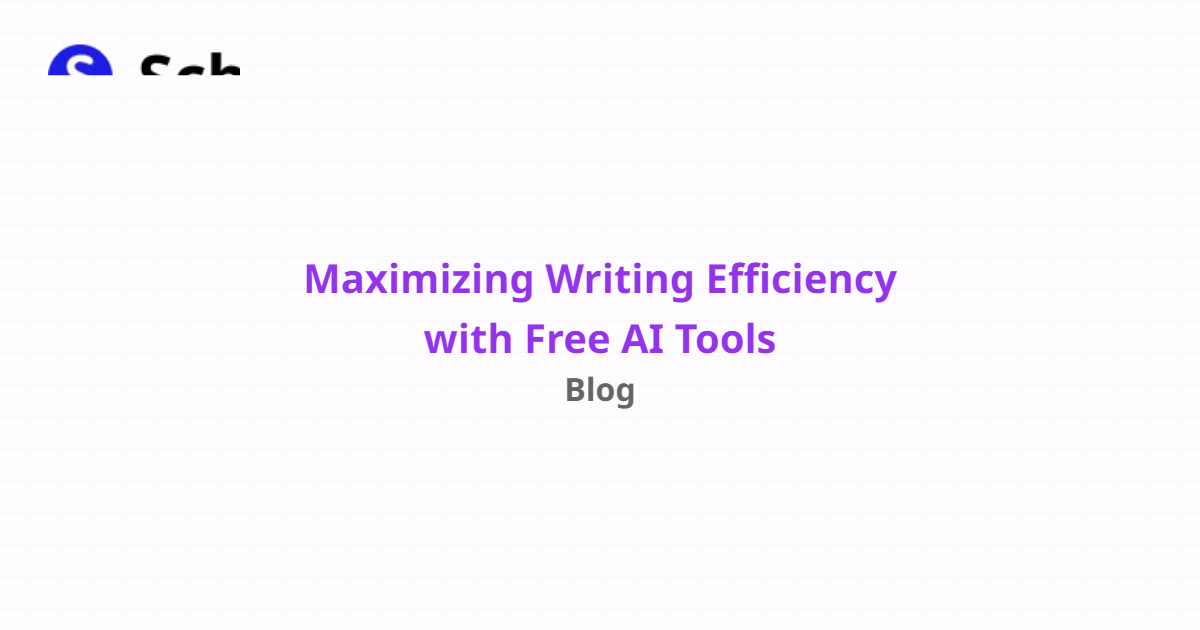Maximizing Writing Efficiency with Free AI Tools
Uncover the secret to maximizing writing efficiency with free AI tools. This comprehensive guide dives deep into the past, present, and future of AI writing aids, offering a detailed analysis of benefits, significance, best practices, and more. Explore an array of tools and techniques designed to enhance your writing, uncover the pros and cons, and learn how AI is reshaping the way we write. Sign up for Scholarly to revolutionize your writing process with advanced AI features.

In today's fast-paced digital world, writing efficiency is more than just a goal; it's a necessity. With the advent of artificial intelligence, writers from all fields have found an ally in AI tools that can significantly boost productivity and creativity. This article, rich with insights and expert advice, will guide you through the journey of maximizing writing efficiency using the best free AI tools available.
Introduction
This article gives an extensive overview of how AI tools have revolutionized the writing process, enhancing both speed and quality. From discussing the history of writing aids to exploring the current state-of-the-art tech advancements, we'll offer practical tips and highlight the key tools that can help you write more efficiently. Expect references to Scholarly, which exemplifies AI's power to transform writing and study habits. Join Scholarly today by signing up here: Scholarly Registration.
History
Past State
The world of writing has long sought ways to ease the burden on the writer's quill. From the first word processors to spellcheckers and grammar tools, the past state of writing aids has been a story of slow but steady progress. Early apps merely scratch the surface of what AI can do today.
Current State
Today, AI has catapulted the writing efficiency into new realms. Tools such as Grammarly, Hemingway, and of course, Scholarly's smart features for flashcard creation and text completion, have changed the way we write and learn.
Future State
As AI continues to evolve, we're edging closer to a world where writing aids are indistinguishable from human assistants. AI's future in writing promises even more personalized support, helping to ideate, design, and polish content at unprecedented levels.
Benefits
Boost your writing efficiency with these benefits of using AI tools:
Increased Speed
Improved Accuracy
Enhanced Creativity
Seamless Workflow
AI-Powered Learning
Significance
The significance of AI writing tools lies in their transformative ability, providing writers with unprecedented command over their craft. The historical evolution from traditional tools to AI underscores their growing importance.
Best Practices
To fully leverage the advantages of AI writing aids, follow these best practices:
Consistent Use
Customization
Exploring Features
Integrating Into Workflow
Keeping Up With Updates
Pros and Cons
Embrace the full spectrum of AI writing aids by understanding the pros and cons:
Pro: Efficiency
Con: Overdependence
Pro: Accessibility
Con: Learning Curve
Pro: Innovation
Pro: Collaboration
Con: Privacy Concerns
Comparison
Discover how different tools measure up:
Scholarly vs Traditional Tools
AI-Powered vs Manual Methods
Methods
Unlock the full potential of your writing with these methods:
Structured Outlining
Rapid Drafting
AI Impact
AI Applications
AI Techniques
AI Benefits
Explore Scholarly's range of AI features, from flashcard creation to text-to-speech (TTS).
AI Challenges
AI Online Apps
Common Techniques
Refine your writing with techniques that stand the test of time:
The Pomodoro Technique
Mind Mapping
Challenges
Identify and overcome common hurdles in writing:
Writer's Block
Time Management
Potential Online Apps
Check out these highly recommended apps to enhance your writing:
Scholarly
Evernote
More Subheadings
Explore additional areas related to maximizing writing efficiency:
Time-Management Tools
Digital Detox for Writers
Cognitive Enhancers
Data Security in Writing
Conclusion
In summary, this article has explored the significant role of AI in writing efficiency, weighing its many benefits against possible drawbacks, and offering a comparative analysis of tools like Scholarly. As writers, it's essential to stay informed and utilize the best resources at our disposal. Don't miss the chance to transform your writing experience; sign up for Scholarly now.
Try Our Popular AI Study Tools
Transform your study materials into interactive learning experiences with our most popular AI-powered tools:
PDF to Flashcards
Convert lecture notes and textbooks into study flashcards instantly
Text to Flashcards
Turn any text or notes into comprehensive flashcard sets
Image to Flashcards
Convert diagrams and handwritten notes into digital flashcards
YouTube to Flashcards
Generate flashcards from educational video content



